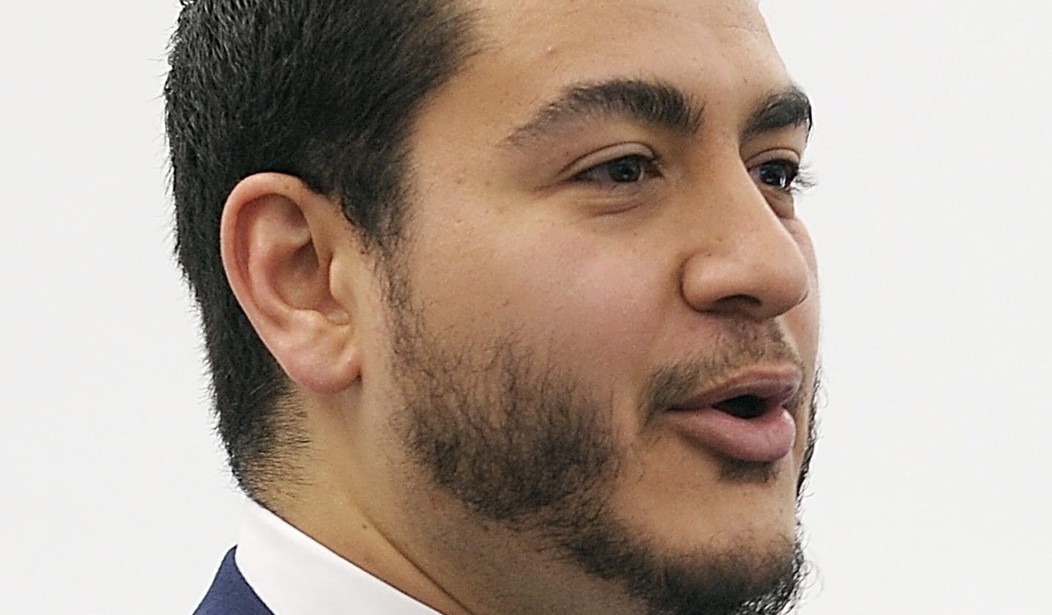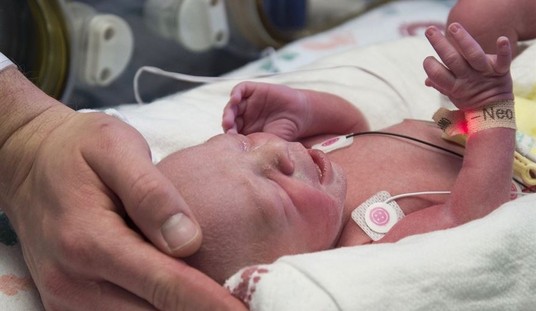On August 24, the Guardian ran an unusually long profile of one Abdul El-Sayed, a 32-year-old Muslim doctor and son of Egyptian immigrants who is already campaigning heavily for governor of Michigan, even though the election won’t take place until November of next year. The headline on Drew Philp’s article dubbed El-Sayed “the new Obama.”
It was the ultimate puff piece, shameless in its utter lack of objectivity and balance, and it began, as such pieces invariably do, with an anecdote calculated to win sympathy for the subject. When he was seven years old, writes Philp, El-Sayed “sat in the eye of Hurricane Andrew,” drinking juice “while swaddled under mattresses between his father and stepmother, who was holding El-Sayed’s newborn baby brother just home from the hospital.”
What does this story have to do with anything? For Philp, it is a metaphor: “At the moment,” he suggests, “American politics feels a bit like being in the eye a hurricane.” Donald Trump is ready to attack North Korea; neo-Nazis paraded in Charlottesville. “No one man can stop the hurricane,” admits Philp. “But in Michigan, a grown-up El-Sayed is now having a go, trying to keep the storm at bay.” El-Sayed, you see, seeks “not just to win, but also to change American politics itself” by becoming “the first Muslim governor in US history.”
Philp goes on to depict El-Sayed as a progressive hero who is struggling against an army of Yahoos. He follows El-Sayed to Adrian, Mich. (“Trump country, white and Christian,” and “the kind of place with lots and lots of American flags”), where the candidate is introduced to an audience by a transgender man (“a brave choice for a region still coming to terms with gay rights, let alone trans rights”). El-Sayed shares “his personal story” with the audience, then goes into some “soaring rhetoric” about “hope and commonality.”
When he takes questions, one “clearly agitated man” asks him about sharia law. El-Sayed replies by saying that he supports separation of church and state and that he wouldn’t take away anyone else’s right to pray and wouldn’t want that right to be taken from him either. (He has made it clear that he prays several times a day.) For this, the audience gives him “an enormous round of applause” – even though El-Sayed’s answer is a total dodge.
Repeatedly, El-Sayed has described himself as a devout Muslim: he prays several times a day; he has said that “his Islamic values are at the center of his work as a civil servant”; his father is an imam. If he’s a devout Muslim, that means he firmly supports sharia law. But how does he square this with his purported approval of secular government? Is he a devout Muslim or a devout believer in the separation of religion and state? You can’t be both.
Whether or not Philp recognizes this contradiction, he certainly doesn’t confront El-Sayed with it. Instead he approaches the religion issue this way: “The rumors surrounding El-Sayed’s faith are small but persistent, spread by a handful of far-right websites preying on the uninformed and fearful.”
He doesn’t spell out what kind of “rumors” he’s talking about, but his message is clear: only “the uninformed and fearful” (and Islamophobes) would be concerned about a having a Muslim governor. “It’s tempting to make any story about El-Sayed about his faith,” writes Philp. “But to reduce him to his faith would also be a disservice. His story is one of responsibility, courage and hope.”
Hope, hope, hope – that’s the mantra here. Never mind that America is still getting over feeling burned by Obama’s empty repetition of that word.
Then there’s El-Sayed’s staffers, with whom Philp is as impressed as he is with the candidate himself: they’re “young, fun and smart” and “hail from Harvard and other elite institutions” and are “incredibly diverse.” Philp tells us about a bathroom visit during which he sees one of El-Sayed’s staffers, a Muslim, “washing his feet in the sink before praying,” while another, “pierced and dyed and queer,” washes his hands in the next sink.
Oh good, another gay guy who thinks Muslims and gays are, as they say, “allies in oppression.”
There are a few details about El-Sayed that Philp doesn’t mention, obviously because they would damage the glowing picture he’s trying to paint of the guy. For one thing, El-Sayed is chummy with Linda Sarsour, the hijab-wearing Women’s March organizer who is a vocal proponent of jihad and sharia law (and who has enthusiastically endorsed his candidacy). At the University of Michigan, El-Sayed was vice-president of the Muslim Student Association, an affiliate of the Muslim Brotherhood.
His wife wears hijab, a fact that seriously undermines the image he seeks to project, and her father is a former president and current board member of the Michigan chapter of the terrorist-linked Council on American-Islamic Relations (CAIR). In 2012, when he was in med school, El-Sayed received a Paul and Daisy Soros Fellowship. Paul Soros, who died the next year, was George Soros’s brother; some sources maintain that the Soros empire is funding El-Sayed’s campaign and grooming him to eventually become president.
Ignoring all this, Philp concludes his piece with a dose of the kind of phony uplift that, again, in the wake of Obama, can only make a sensible reader react with cynicism: “He’s a man who believes politics can be changed, repaired even. His is a story at least as old as the United States, about a person who believes what we were taught in grade school: that all people are created equal, that change can come, that we can live up to our ideals.”
Philp’s snow job appeared about a month after an even longer, if somewhat less breathlessly adulatory, profile of El-Sayed ran in Politico. Both pieces posed the same question — are Michiganders too racist to vote for a Muslim? – the implication being that any concern about a candidate being a Muslim would amount to racism.
Politico quoted voters who spoke about El-Sayed’s religion as if it were a harmless aspect of his identity. “Goddamn, I’m an Irish Catholic,” one man said. “We got off a boat and we were discriminated against 150 years ago.” A retired teacher confided: “I think once people hear him … you kind of just forget” that he’s a Muslim.
Yes, it’s hard not to surmise that there’s a lot of forgetting going on here. And denial. And ignorance – specifically, sheer ignorance of the very basics of Islam. El-Sayed and those who are pushing his candidacy are apparently counting on Michigan voters to love him for the same vapid reasons they loved Obama – because he specializes in “soaring rhetoric” about “hope and commonality” and makes them feel impressed with themselves for supporting a dark-skinned guy with a Muslim name.
You’d think the actual Obama record would have inoculated the American electorate against such puerile, irresponsible thinking for at least a generation. And you’d think that in 2017 – when the West has been hammered repeatedly, since 9/11, with brutal terrorist acts rooted in Islamic belief and when mass Muslim immigration into Europe has vividly demonstrated the incompatibility of Islam and Western freedom – a politician’s Muslim faith wouldn’t be a matter of indifference to so many Americans.
But no. Voters seem eager to embrace El-Sayed, and fourteen months before the gubernatorial election the media on both sides of the Atlantic are already selling him every bit as eagerly as they sold Obama. How far we have failed to come!









Join the conversation as a VIP Member